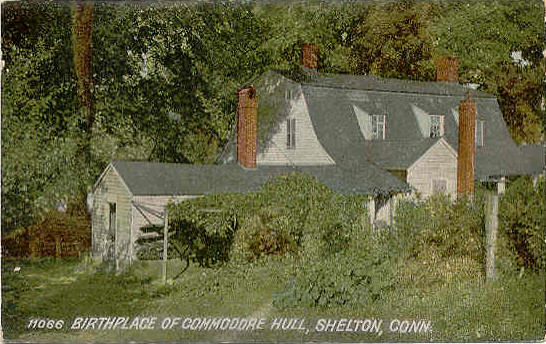|
Hull Street (Savannah, Georgia)
Hull Street is a prominent street in Savannah, Georgia, United States. Located between Oglethorpe Avenue to the north and Perry Street to the south, it runs for about from Jefferson Street in the west to East Broad Street in the east. It is interrupted by Colonial Park Cemetery from Abercorn Street to Habersham Street. Originally known only as Hull Street singular, its addresses are now split between "West Hull Street" and "East Hull Street", the transition occurring at Bull Street in the center of the downtown area. Hull Street is named for commodore Isaac Hull, who served in the War of 1812. The street is entirely within Savannah Historic District, a National Historic Landmark District.James Dillon (1977) , National Park Service and Hull Street passes through three squares on their northern side. From west to east: * Orleans Square *Chippewa Square *Crawford Square Notable buildings and structures Below is a selection of notable buildings and structures on Hull Stree ... [...More Info...] [...Related Items...] OR: [Wikipedia] [Google] [Baidu] |
Isaac Hull
Isaac Hull (March 9, 1773 – February 13, 1843) was a Commodore in the United States Navy. He commanded several famous U.S. naval warships including ("Old Ironsides") and saw service in the undeclared naval Quasi War with the revolutionary French Republic (France) 1796–1800; the Barbary Wars (1801–1805, 1815), with the Barbary states in North Africa; and the War of 1812 (1812–1815), for the second time with Great Britain. In the latter part of his career he was Commandant of the Washington Navy Yard in the national capital of Washington, D.C., and later the Commodore of the Mediterranean Squadron. For the infant U.S. Navy, the battle of USS ''Constitution'' vs HMS ''Guerriere'' on August 19, 1812, at the beginning of the war, was the most important single ship action of the War of 1812 and one that made Isaac Hull a national hero. Early life Hull was born in Derby, Connecticut (some sources say Huntington, now Shelton, Connecticut), on March 9, 1773. Early in life he j ... [...More Info...] [...Related Items...] OR: [Wikipedia] [Google] [Baidu] |
War Of 1812
The War of 1812 (18 June 1812 – 17 February 1815) was fought by the United States of America and its indigenous allies against the United Kingdom and its allies in British North America, with limited participation by Spain in Florida. It began when the United States declared war on 18 June 1812 and, although peace terms were agreed upon in the December 1814 Treaty of Ghent, did not officially end until the peace treaty was ratified by Congress on 17 February 1815. Tensions originated in long-standing differences over territorial expansion in North America and British support for Native American tribes who opposed US colonial settlement in the Northwest Territory. These escalated in 1807 after the Royal Navy began enforcing tighter restrictions on American trade with France and press-ganged men they claimed as British subjects, even those with American citizenship certificates. Opinion in the US was split on how to respond, and although majorities in both the House and ... [...More Info...] [...Related Items...] OR: [Wikipedia] [Google] [Baidu] |
Downtown Buildings -- The Citizens And Southern Bank, Savannah, Ga
''Downtown'' is a term primarily used in North America by English speakers to refer to a city's sometimes commercial, cultural and often the historical, political and geographic heart. It is often synonymous with its central business district (CBD). Downtowns typically contain a small percentage of a city’s employment. In some metropolitan areas it is marked by a cluster of tall buildings, cultural institutions and the convergence of rail transit and bus lines. In British English, the term " city centre" is most often used instead. History Origins The Oxford English Dictionary's first citation for "down town" or "downtown" dates to 1770, in reference to the center of Boston. Some have posited that the term "downtown" was coined in New York City, where it was in use by the 1830s to refer to the original town at the southern tip of the island of Manhattan.Fogelson, p. 10. As the town of New York grew into a city, the only direction it could grow on the island was toward the ... [...More Info...] [...Related Items...] OR: [Wikipedia] [Google] [Baidu] |
Julius Perlinski House
The gens Julia (''gēns Iūlia'', ) was one of the most prominent patrician families in ancient Rome. Members of the gens attained the highest dignities of the state in the earliest times of the Republic. The first of the family to obtain the consulship was Gaius Julius Iulus in 489 BC. The gens is perhaps best known, however, for Gaius Julius Caesar, the dictator and grand uncle of the emperor Augustus, through whom the name was passed to the so-called Julio-Claudian dynasty of the first century AD. The Julius became very common in imperial times, as the descendants of persons enrolled as citizens under the early emperors began to make their mark in history.''Dictionary of Greek and Roman Biography and Mythology'', vol. II, pp. 642, 643. Origin The Julii were of Alban origin, mentioned as one of the leading Alban houses, which Tullus Hostilius removed to Rome upon the destruction of Alba Longa. The Julii also existed at an early period at Bovillae, evidenced by a ve ... [...More Info...] [...Related Items...] OR: [Wikipedia] [Google] [Baidu] |




.jpg)